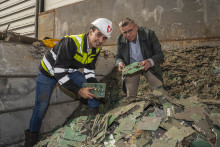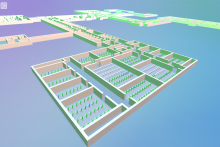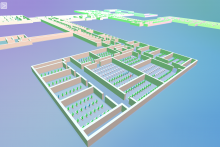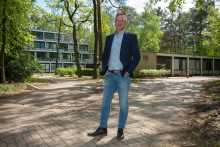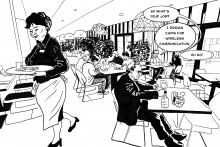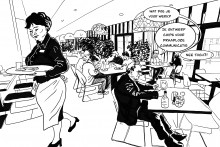Riwald Recycling in Almelo is a well-organized and surprisingly clean facility. Neat piles of copper, aluminum, plastic and print-board pieces, wait for further processing. A huge heap of old magnetrons, vacuum cleaners and washing machines will soon be shredded and separated into different components. ‘Our company is specialized in mechanical separation of metal waste. All steps in the process are performed at one location. That makes us unique in the recycling business’, Manager Ömer Avci says.
Although the company’s separation and recycling percentage is high, around 88 %, some components are difficult to process, for example, the washing machines’ plastic parts. Schuur picks up a plastic part from the pile. ‘Recycling plastic pieces like this can be a challenge, because there are so many different kinds of plastic, each with their own composition’, he says. ‘To make recycling possible, together with our research partners, we aim to develop an optimal separation recipe for these plastics, based on chemical technologies, like pyrolysis or liquid extraction.’ In a next step, Riwald Recycling can subsequently scale the process for industrial application.
Problematic waste
In The Netherlands, recycling of waste is quite well organized. Many types of waste can be reused, for example, plastic, paper and organic waste. However, some waste streams are difficult to reuse and end-up in the incinerator, where potentially valuable materials are being lost. ‘Some streams pose a real challenge to recycle’, Boelo Schuur says. Schuur is Program Director at The Institute for Sustainable Process Technology (ISPT), but also participates with research on new separation technologies. ‘Especially wet waste can be a problem, for example, those streams containing a mixture of wet paper and plastic, or organic waste mixed with undegradable compounds. Many of these substances are diluted or dissolved in the water present. To remove them is a very energy-intensive process.’ For example, beer bottle labels are made from special, water-resistant paper, and eventually end up in a wet stream that is difficult to process and recycle.
'The process is very similar to breaking down a Lego building into individual Lego cubes to make a new structure'
Separation challenge
Within the frame work of the project ReBBlocCS, funded by ‘Netherlands Enterprise Agency’, universities and companies join forces to improve the recovery of valuable substances from these difficult waste streams. Participants from the business side include small businesses, like BioBTX, that have state of the art technologies to recover valuable chemicals from waste. After recovery, large industrial partners, such as DOW Chemical, use them as building blocks to make new products. The Universities contribute with specific knowledge to optimize waste processing and recovery technologies. ‘The core of the project is to use a combination of technologies to efficiently convert difficult to process waste streams into chemical building blocks’, Schuur explains. ‘The process is very similar to breaking down a Lego building into individual Lego blocks, that can subsequently be used to make a new structure. However, the extraction of these chemical blocks, without impurities, is a true separation challenge.’
Step by step process
In the project, there are three main conversion technologies to deal with difficult waste: microbial conversions, pyrolysis and gassifiction. Using a combination of these technologies, a step-by-step process, scientists are able to convert waste into useful chemicals. As a first step, microorganisms can be applied in mixed waste, which contains organic components, such as paper or kitchen waste, as well as non-biodegradable parts, such as plastic. The microorganisms convert the organic substances into glucose, after which a next step treats the remaining plastic. Then, the second conversion step, pyrolysis (companies Alucha and BioBTX are involved), reduces the (plastic) waste to its basic building blocks. During this process, waste is heated to 500 °C and because no oxygen is present, the material doesn’t burn, but is converted into different fractions: the Lego blocks. These fractions consist of valuable components, that can be extracted and reused.
'For the mix of smaller molecules, we are developing separation technologies together with the European Membrane Institute that is also located in our laboratories'
High-value polymers
The start-up company BioBTX, partner in the project, has refined and optimized this technology and uses a two-step process to efficiently treat a mixed waste stream, for example plastic and organic waste, without the use of microorganisms. The first pyrolysis step cracks plastic and organic (biomass) molecules into smaller molecules, that together end-up in a vapor, while metals end up in the solids stream. These can subsequently be removed for reuse. In the next step, the company synthesizes benzene, toluene, and xylene (BTX) from the smaller molecules present in the vapor. The beauty of their method is that it can be applied to plastic waste, but also to more complex mixtures of plastics and some organics, but for this approach high plastic content and low water content is preferred. ‘Some of the main fractions resulting from the BioBTX technology can be used as raw materials for high-value polymers to make fibers’, Schuur explains. ‘For the mix of smaller molecules, we are developing separation technologies together with EMI Twente that is also located in our laboratories. The separated fractions can then be sent to a naphtha cracker that produces raw materials to synthesize polymers.’

The third important waste treatment technology is gasification. At much higher temperatures than pyrolysis, above 800 °C, and with no oxygen present, waste is predominantly converted into carbon monoxide (CO) and hydrogen (H2) gas. This mixture, called synthesis gas, can be used to make all kinds of chemicals, from biodiesel and biokerosene to polymers. ‘This technology can be used for all waste streams containing organic substances’, Schuur explains. It’s is some kind of ‘back-up’ solution. It eats everything, but is not necessarily the most economic option.’
Combination of treatments
However, the composition of complex waste streams differs all the time, and for a successful and efficient resource recovery, a combination of these different treatments, custom-made for each stream, has to be used. That means that every time the scientists have to make decisions what methods are most suitable for that particular stream. ‘Wageningen University will perform the necessary evaluation and calculations to decide which combination of separation methods is the most suitable for a certain waste stream’, Schuur explains. ‘These processes may start with a rough physical separation into similar fractions, or pre-treatment using microorganisms. We can then individually process the remaining fractions into the final building blocks. This results in an optimal range of recycled chemicals for use in the industry.’
Mild separation technologies
Although the two-step pyrolysis of BioBTX is an important technology to degrade a lot of different types of waste, the resulting chemicals, aimed at providing building blocks, might be contaminated with compounds like sulfur, chlorine or bromine. ‘If concentrations of these contaminants are too high, above 10 ppm, the further conversion into suitable chemicals in naphtha crackers is impossible’, Schuur says. ‘So, in our Twente labs we will develop suitable, mild separation technologies to remove these. For example, state of the art extraction and adsorption technologies might be effective.’
In about four years, the scientists expect that the project will offer technologies to transform hard-to-recycle waste into building blocks for the chemical industries. By turning waste into valuable building blocks for reuse, cycles are closed, adding to a more sustainable society.



